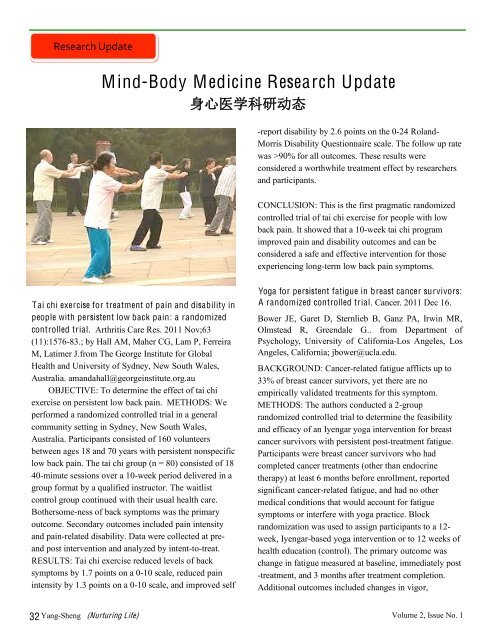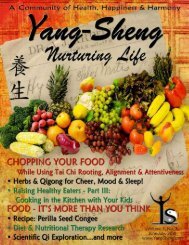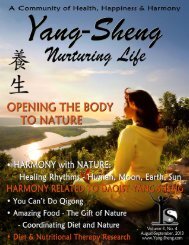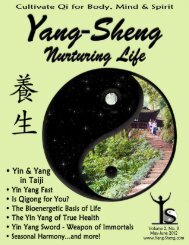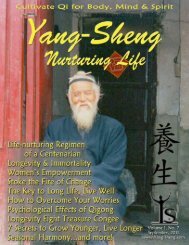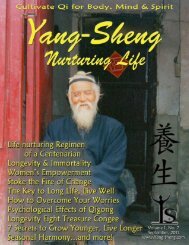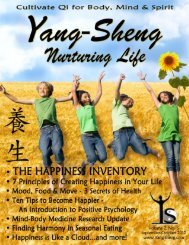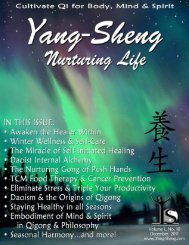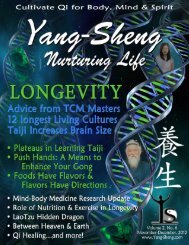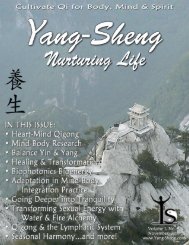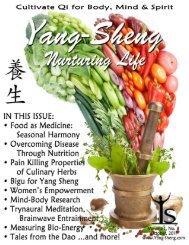Download PDF - Yang-Sheng
Download PDF - Yang-Sheng
Download PDF - Yang-Sheng
Create successful ePaper yourself
Turn your PDF publications into a flip-book with our unique Google optimized e-Paper software.
Research Update<br />
Mind-Body Medicine Research Update<br />
身心医学科研动态<br />
Tai chi exercise for treatment of pain and disability in<br />
people with persistent low back pain: a randomized<br />
controlled trial. Arthritis Care Res. 2011 Nov;63<br />
(11):1576-83.; by Hall AM, Maher CG, Lam P, Ferreira<br />
M, Latimer J.from The George Institute for Global<br />
Health and University of Sydney, New South Wales,<br />
Australia. amandahall@georgeinstitute.org.au<br />
OBJECTIVE: To determine the effect of tai chi<br />
exercise on persistent low back pain. METHODS: We<br />
performed a randomized controlled trial in a general<br />
community setting in Sydney, New South Wales,<br />
Australia. Participants consisted of 160 volunteers<br />
between ages 18 and 70 years with persistent nonspecific<br />
low back pain. The tai chi group (n = 80) consisted of 18<br />
40-minute sessions over a 10-week period delivered in a<br />
group format by a qualified instructor. The waitlist<br />
control group continued with their usual health care.<br />
Bothersome-ness of back symptoms was the primary<br />
outcome. Secondary outcomes included pain intensity<br />
and pain-related disability. Data were collected at pre-<br />
and post intervention and analyzed by intent-to-treat.<br />
RESULTS: Tai chi exercise reduced levels of back<br />
symptoms by 1.7 points on a 0-10 scale, reduced pain<br />
intensity by 1.3 points on a 0-10 scale, and improved self<br />
-report disability by 2.6 points on the 0-24 Roland-<br />
Morris Disability Questionnaire scale. The follow up rate<br />
was >90% for all outcomes. These results were<br />
considered a worthwhile treatment effect by researchers<br />
and participants.<br />
CONCLUSION: This is the first pragmatic randomized<br />
controlled trial of tai chi exercise for people with low<br />
back pain. It showed that a 10-week tai chi program<br />
improved pain and disability outcomes and can be<br />
considered a safe and effective intervention for those<br />
experiencing long-term low back pain symptoms.<br />
Yoga for persistent fatigue in breast cancer survivors:<br />
A randomized controlled trial. Cancer. 2011 Dec 16.<br />
Bower JE, Garet D, Sternlieb B, Ganz PA, Irwin MR,<br />
Olmstead R, Greendale G.. from Department of<br />
Psychology, University of California-Los Angeles, Los<br />
Angeles, California; jbower@ucla.edu.<br />
BACKGROUND: Cancer-related fatigue afflicts up to<br />
33% of breast cancer survivors, yet there are no<br />
empirically validated treatments for this symptom.<br />
METHODS: The authors conducted a 2-group<br />
randomized controlled trial to determine the feasibility<br />
and efficacy of an Iyengar yoga intervention for breast<br />
cancer survivors with persistent post-treatment fatigue.<br />
Participants were breast cancer survivors who had<br />
completed cancer treatments (other than endocrine<br />
therapy) at least 6 months before enrollment, reported<br />
significant cancer-related fatigue, and had no other<br />
medical conditions that would account for fatigue<br />
symptoms or interfere with yoga practice. Block<br />
randomization was used to assign participants to a 12week,<br />
Iyengar-based yoga intervention or to 12 weeks of<br />
health education (control). The primary outcome was<br />
change in fatigue measured at baseline, immediately post<br />
-treatment, and 3 months after treatment completion.<br />
Additional outcomes included changes in vigor,<br />
32 <strong>Yang</strong>-<strong>Sheng</strong> (Nurturing Life) Volume 2, Issue No. 1


